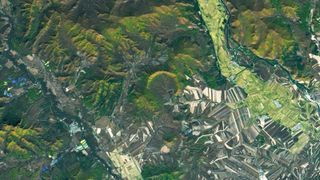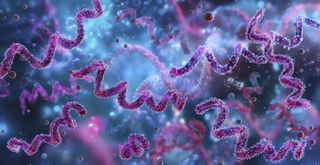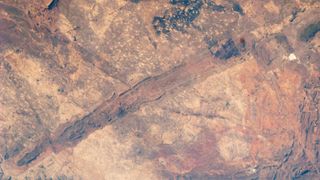Features
Latest Features

Science history: Carbon-14 is discovered, opening a window into past civilizations — Feb. 27, 1940
By Tia Ghose published
Martin Kamen and Samuel Ruben's discovery of the radioactive isotope carbon-14 in 1940 helped usher in a new era of dating artifacts from past civilizations.

A parasite never before seen in humans was behind a woman's lung infection, organ damage and forgetfulness
By Mindy Weisberger published
A woman developed a persistent infection, and doctors couldn't pinpoint the cause for many months.

Incomplete remains of world's 'youngest' impact crater spotted lurking in Chinese forest
By Harry Baker published
Earth from space A 2021 satellite photo shows off the recently uncovered Yilan crater in China, which is most likely the youngest impact structure on Earth. The incomplete ring is also the largest of its kind and only the second impact crater ever found in the country.

Lotus shoes: Tiny footwear for Chinese women whose feet were bound as children
By Kristina Killgrove published
Lotus shoes are tiny footwear associated with foot-binding, a beauty practice that lasted for at least a millennium in China.

Closest baby nebula to Earth 'hatches' in strange new Hubble image – Space photo of the week
By Jamie Carter published
A stunning new Hubble image reveals the most detailed look yet at the Egg Nebula, the youngest and closest pre-planetary nebula to Earth.

How can deserts form next to oceans?
By Sara Hashemi published
Deserts are notoriously dry, so why do so many of them border oceans?

What is rigor mortis, and why does it happen?
By Isabel Gil published
Bodies usually stiffen after death in a process known as rigor mortis. But why does this happen, and how long does it last?

Diagnostic dilemma: 83-year-old man's unusual form of syphilis had an 'uncertain' source
By Sophie Berdugo published
A man went to the emergency room after being in and out of hospitals for a month, and doctors found a surprising explanation for his illness.

Hidden beauty of Zimbabwe's 2.5 billion-year-old 'geological marvel' revealed in striking astronaut photo
By Harry Baker published
Earth from space A 2010 astronaut photo shows off the astonishing scale of the Great Dyke of Zimbabwe, which stretches over 340 miles (550 kilometers). The lengthy structure, which is not actually a dike, is full of extremely valuable minerals that fuel a massive mining industry.
Get the world’s most fascinating discoveries delivered straight to your inbox.
 Live Science Plus
Live Science Plus











